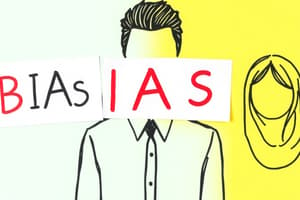Podcast
Questions and Answers
What distinguishes prejudice from bias?
What distinguishes prejudice from bias?
- Prejudice is based on systematic errors in thinking.
- Bias is a more emotional response.
- Prejudice is often an emotional response, while bias is more cognitive. (correct)
- Bias involves preconceived judgments based solely on stereotypes.
Which of the following is a type of bias?
Which of the following is a type of bias?
- Racism
- Sexism
- Confirmation bias (correct)
- Homophobia
Which type of content is considered factual?
Which type of content is considered factual?
- News articles (correct)
- Opinionated articles
- Advertisements
- Personal blogs
What is the role of evidence in evaluating a claim's validity?
What is the role of evidence in evaluating a claim's validity?
Which step is NOT part of the fact-checking process?
Which step is NOT part of the fact-checking process?
Which of these statements accurately reflects the relationship between prejudice and discrimination?
Which of these statements accurately reflects the relationship between prejudice and discrimination?
What does the availability heuristic illustrate?
What does the availability heuristic illustrate?
Which factor is NOT essential when evaluating the credibility of content?
Which factor is NOT essential when evaluating the credibility of content?
Flashcards
Prejudice
Prejudice
An unjustified attitude towards individuals based on group membership.
Bias
Bias
A systematic error in thinking affecting decisions and judgments.
Types of Prejudice
Types of Prejudice
Includes racism, sexism, homophobia, and religious prejudice.
Types of Bias
Types of Bias
Signup and view all the flashcards
Claim
Claim
Signup and view all the flashcards
Evidence
Evidence
Signup and view all the flashcards
Fact-Checking
Fact-Checking
Signup and view all the flashcards
Validity
Validity
Signup and view all the flashcards
Study Notes
Types of Prejudice and Bias
- Prejudice is an unjustified or incorrect attitude (affect) towards an individual based solely on their membership of a particular group.
- Bias is a systematic error in thinking that affects the decisions and judgments people make.
- Prejudice is a more emotional response, whereas bias is more cognitive. Prejudice and bias can often occur together.
- Types of prejudice include racism, sexism, homophobia, and religious prejudice.
- Types of bias include confirmation bias (favoring information confirming existing beliefs), anchoring bias (over-reliance on initial information), and availability heuristic (overestimating the likelihood of easily recalled events).
Bias or Prejudice
- Prejudice involves preconceived judgments about a group of people, often based on stereotypes.
- Bias is a systematic tendency to favor one thing over another that influences how people perceive information.
- Prejudice and bias can result in discrimination, which involves treating people unfairly.
- Both prejudice and bias can be conscious or unconscious.
Types of Content
- Content can be classified into various categories, including news articles, social media posts, advertisements, and personal blogs.
- Determining the credibility and reliability of content is crucial for avoiding misinformation.
- Consider the source, authors, and intended audience when evaluating content.
- Content can be factual, opinionated, or a mixture of both.
Claim, Evidence, or Validity
- A claim is a statement that asserts something is true or false.
- Evidence is supporting material, it corroborates a claim.
- Validity refers to the strength of a claim. If a claim is valid, it is supported by sufficient evidence.
- Evaluating a claim's validity depends on corroborations from valid sources, quality of the evidence, and how well the evidence supports the claim.
Process of Fact-Checking
- Fact-checking involves determining the accuracy of information.
- Steps in fact-checking include identifying the claim, finding credible sources, comparing evidence, and verifying the claim.
- Verification entails determining whether the supporting evidence backs up the claim, searching for contradictory evidence, and understanding the specific context.
- Look for corroborating evidence from multiple independent sources.
- Fact-checking process involves comparing information against a set of criteria.
Studying That Suits You
Use AI to generate personalized quizzes and flashcards to suit your learning preferences.




